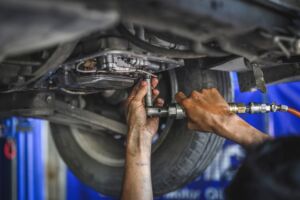Although winter is regarded as “the most wonderful time of year,” it can wreak havoc on your vehicle, especially your transmission. The cold weather can make it more difficult for transmission to operate properly. Understanding what can cause your transmission to have trouble operating helps prevent costly transmission repair.
In this blog, we’ll go over what effect cold weather has on your transmission and tips to help prevent costly transmission repair.
How Does Cold Weather Affect Transmissions?
It’s important to understand that transmission problems can happen all year round, but in winter, some specific issues only occur in winter due to the temperature. The cold weather, in particular, can lead to transmission slipping, which then would need transmission repair services. Some common transmission problems in winter include the following.
Viscosity Changes
The viscosity of your vehicle’s transmission fluid actually changes when the weather gets colder. When it gets below zero degrees, the fluid can become too thick to properly lubricate the internal parts of your transmission. When the internal parts of your transmission aren’t well lubricated, it can wear them down. One solution to this problem is to choose synthetic fluid, which is less likely to be as vicious in cold weather.
Cold Weather Contractions
Another unique issue that occurs in winter is that the cold temperatures cause metal parts to shrink or contract. When these metal components contract, they can leave little gaps between parts that aren’t usually there. This can lead to the loosing of components, leaks developing, parts wearing down prematurely, or water entering the gaps.
Shifting Problems
When it becomes colder, the transmission shifts harder, and the shift points can become more delayed, leading to harder shifting. Whether your transmission is automatic or manual, you may start to notice new sounds or slower shifting. These hard shifts create increased pressure on various parts, which without intervention and transmission repairs, increase the risk of transmission failure at a later point.
Delayed Overdrive
In most cases, when it’s cold, your transmission’s computer will delay using overdrive until the transmission gets to proper operating temperatures. Overdrive helps reduce an engine’s rotations per minute. What this means is that overdrive is responsible for creating a quiet, smooth ride and allows a shift into a higher gear. The overdrive delay caused by cold weather will affect how comfortable your vehicle drives and puts more use and pressure on forward gears.
Water In Your Transmission
It’s never a good thing whenever water gets into your vehicle, especially if it finds its way into your transmission. The way all transmissions are designed is to prevent water from entering. However, parts contracting from cold weather or any other points of entry can allow water to get into the transmission and then expand when it freezes. This can damage the transmission case, internal parts, and form cracks in the valve body. Water in your transmission always spells for costly transmission repairs or, in the worst-case scenario, a transmission replacement.
Winter Transmission Care Tips
To keep your transmission in the best working condition throughout winter, here are a few winter maintenance tips you can follow.
Let Your Vehicle Warm Up Before Driving
Driving in cold weather puts an extra strain on your engine and transmission. It’s also worth noting that modern transmissions rely on information from their sensors and computers. So if the engine is cold, the computer will believe the transmission is too. This causes the computer to modify the transmission’s performance until the sensors indicate it’s at the right operating temperature. It’s best to let your engine warm up a little before driving to help prevent putting excessive strain on your engine and transmission.
Check and Replace Your Fluids
Winter is the optimal time to have your transmission fluid checked and, if necessary, replaced. As previously mentioned, when the weather gets colder, it increases the viscosity of your transmission fluid to be thicker than normal. This can cause issues with certain parts of your transmission not being lubricated as they should, leading to transmission repairs. By checking your fluid it helps ensure your fluid is lubricating your transmission properly in winter.
Check Your Seals
Winter weather can take a particular toll on certain parts of your transmission which can lead to leaks. When the roads are wet and slick from snow and ice, it can allow more grease, grit and moisture to have access to your undercarriage, which can cause more wear on transmission joints, seals, and gaskets.
Keep Your Transmission Winter Ready With Dot Transmissions
The upcoming winter doesn’t have to bring the blues with it to your transmission. By following some of the winter maintenance tips and understanding the effect cold weather has on your transmission can help prevent expensive transmission repair.
Here at Dot Transmissions, we have over 45 years of transmission repair experience and service. If you notice any issues with your transmission or just have an inkling of concern, it’s always best to bring your vehicle in as soon as possible. Early intervention can be the difference between a small transmission repair and a costly one.
Contact us today to book an appointment or to learn more about our transmission repair services in Edmonton.






